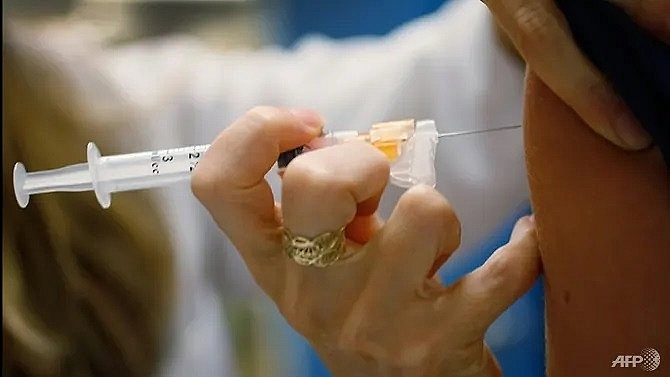UK offers HPV vaccines to boys, aims to stop 100,000 cancer cases
 |
| The human papillomavirus (HPV) vaccine has significantly reduced the incidence of cervical cancer (Photo: AFP/JOE RAEDLE) |
Announcing the extension of a vaccination programme to cover boys as well as girls, experts at Public Health England (PHE) said the immunisation plan would prevent around 64,000 cervical cancers and nearly 50,000 non-cervical cancers by 2058.
This would be 50 years after the introduction of the HPV vaccination programme in Britain - which began in girls in 2008 - when people who were vaccinated as teenagers might otherwise begin to develop HPV-related cancers, PHE said in a statement.
HPV is a sexually transmitted virus linked to more than 99 per cent of cervical cancers, as well as 90 per cent of anal cancers, about 70 per cent of vaginal and vulvar cancers and more than 60 per cent of penile cancers.
PHE said that from September this year boys aged 12 and 13 in Britain will be offered the shots as part of a government health programme.
Since UK girls began getting the HPV vaccine in 2008, studies have shown that infections with some key types of the virus have fallen by 86 per cent in 16 to 21 year-olds in England.
A Scottish study also showed the vaccine had reduced pre-cancerous cervical disease in women by up to 71 per cent.
Robin Weiss, a professor of viral oncology at University College London, said the extension of the HPV programme "should be a win-win situation".
"The HPV vaccine has enjoyed 10 years of success in protecting girls from acquiring cervical cancer as women," he said in an emailed comment. "It appears clear ... that vaccinated boys will themselves benefit from not getting cancer of the penis, anus, and a diminished risk of head and neck cancer."
What the stars mean:
★ Poor ★ ★ Promising ★★★ Good ★★★★ Very good ★★★★★ Exceptional
 Tag:
Tag:
Related Contents
Latest News
More News
- Foreign leaders extend congratulations to Party General Secretary To Lam (January 25, 2026 | 10:01)
- Russian President congratulates Vietnamese Party leader during phone talks (January 25, 2026 | 09:58)
- Worldwide congratulations underscore confidence in Vietnam’s 14th Party Congress (January 23, 2026 | 09:02)
- Political parties, organisations, int’l friends send congratulations to 14th National Party Congress (January 22, 2026 | 09:33)
- 14th National Party Congress: Japanese media highlight Vietnam’s growth targets (January 21, 2026 | 09:46)
- 14th National Party Congress: Driving force for Vietnam to continue renewal, innovation, breakthroughs (January 21, 2026 | 09:42)
- Vietnam remains spiritual support for progressive forces: Colombian party leader (January 21, 2026 | 08:00)
- Int'l media provides large coverage of 14th National Party Congress's first working day (January 20, 2026 | 09:09)
- Vietnamese firms win top honours at ASEAN Digital Awards (January 16, 2026 | 16:45)
- ASEAN Digital Ministers' Meeting opens in Hanoi (January 15, 2026 | 15:33)





















 Mobile Version
Mobile Version